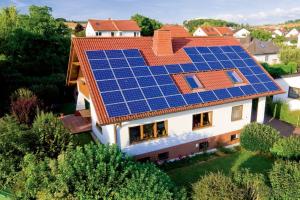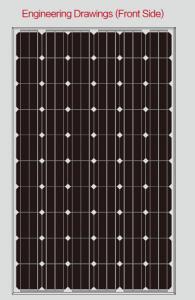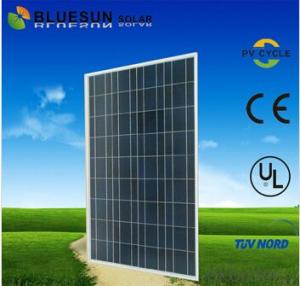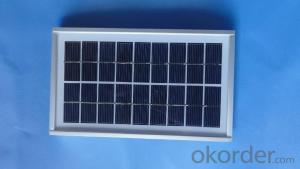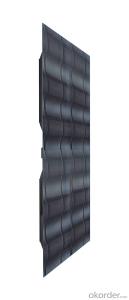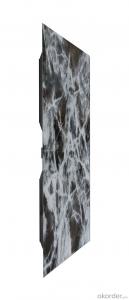Polycrystalline Silicon Solar Modules 48Cell-205W
- Loading Port:
- China Main Port
- Payment Terms:
- TT or LC
- Min Order Qty:
- 1000 watt
- Supply Capability:
- 10000000 watt/month
OKorder Service Pledge
OKorder Financial Service
You Might Also Like
1. Structure of Polycrystalline Silicon Solar Modules 48Cell-205W Description
Solar panel refers either to a photovoltaics (PV) module, a solar hot water panel, or to a set of solar photovoltaics modules electrically
connected and mounted on a supporting structure. A PV module is a packaged, connected assembly of solar cells. Solar panels can be
used as a component of a larger photovoltaic system to generate and supply electricity in commercial and residential applications. Each
module is rated by its DC output power under standard test conditions, and typically ranges from 100 to 320 watts. The efficiency of a
module determines the area of a module given the same rated output – an 8% efficient 230 watt module will have twice the area of a 16%
efficient 230 watt module. There are a few solar panels available that are exceeding 19% efficiency. A single solar module can produce only
a limited amount of power; most installations contain multiple modules. A photovoltaic system typically includes a panel or an array of solar
modules, an inverter, and sometimes a battery and/or solar tracker and interconnection wiring.
2. Main Features of the Polycrystalline Silicon Solar Modules 48Cell-205W
• WARRANTIES
- 10-year limited product warranty1.
- Limited power warranty1: 1 year at 98% of the minimal rated power
output, 10 years at 92% of the minimal rated power output, 25 years
at 82% of the minimal rated power output.
1In compliance with our Warranty Terms and Conditions.
• QUALIFICATIONS & CERTIFICATES
IEC 61215, IEC 61730, MCS, CE, ISO 9001:2008, ISO 14001:2004, BS OHSAS 18001:2007, PV Cycle, SA 8000
3. Polycrystalline Silicon Solar Modules 48Cell-205W Images
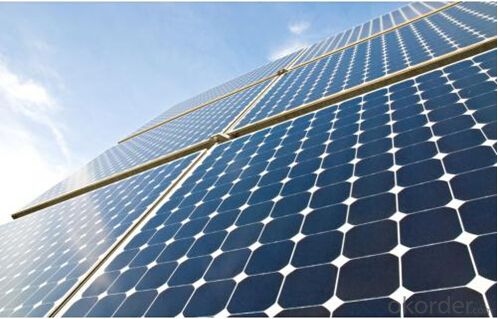
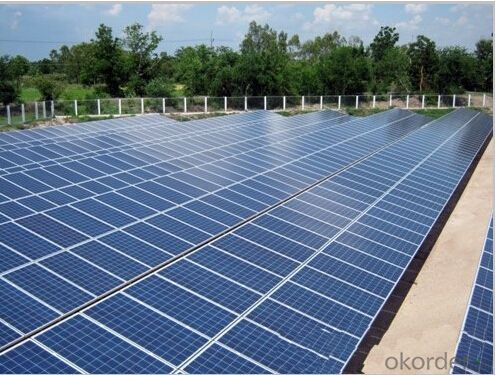
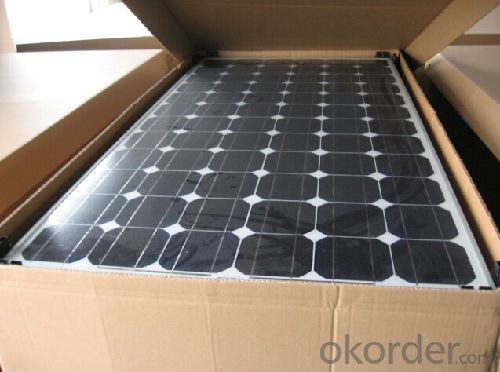
4. Polycrystalline Silicon Solar Modules 48Cell-205W Specification
窗体顶端 ELECTRICAL PERFORMANCE窗体底端 | |||
Power output | P max | W | 205 |
Power output tolerances | ΔP max | W | 0/+5 |
Module effi ciency | η m | % | 15.8 |
Voltage at Pmax | V mpp | V | 24.5 |
Current at Pmax | I mpp | A | 8.36 |
Open-circuit voltage | V oc | V | 30.9 |
Short-circuit current | I sc | A | 8.94 窗体底端 |
5. FAQ of Polycrystalline Silicon Solar Modules 48Cell-205W
Q1:Can we visit your factory?
A1:Sure,welcome at any time,seeing is believing.
Q2:Which payment terms can you accept?
A2:T/T,L/C,Moneygram,Paypal are available for us.
- Q:Can solar panels be used for powering an airport or transportation hub?
- Yes, solar panels can be used to power an airport or transportation hub. Solar energy is a clean and renewable source of power that can be harnessed to generate electricity. By installing solar panels on rooftops, parking lots, or even dedicated solar farms, airports and transportation hubs can significantly reduce their carbon footprint and reliance on traditional energy sources.
- Q:Can solar panels be installed on any type of roof?
- Solar panels can be installed on almost any type of roof, including asphalt shingle, metal, tile, and flat roofs. However, the feasibility and ease of installation may vary depending on the roof's condition, angle, and orientation towards the sun.
- Q:Can solar panels be installed on agricultural or farming operations?
- Yes, solar panels can be installed on agricultural or farming operations. In fact, many farmers and agricultural businesses are increasingly adopting solar energy as a sustainable and cost-effective solution to power their operations. Solar panels can be mounted on rooftops, open land, or even on barns and sheds, providing clean and renewable energy to offset electricity costs and reduce carbon emissions. Additionally, solar panels can help farmers take advantage of unused or underutilized land, providing dual benefits of energy generation and agricultural productivity.
- Q:Can solar panels be installed on satellites?
- Yes, solar panels can be installed on satellites. In fact, solar panels are commonly used on satellites to provide them with a reliable source of renewable energy.
- Q:Are there different types of solar panels?
- Yes, there are different types of solar panels, including monocrystalline, polycrystalline, and thin-film panels. Each type has its own unique characteristics and efficiency levels, making them suitable for different applications and environments.
- Q:what is the average cost, for a single family home, to install solar panels? I live in CA.
- Just to be sure - when you say solar panels - are you thinking of hot water or electricity? For electrical power the system must photovoltaic.
- Q:Can solar panels be installed on sloped roofs?
- Yes, solar panels can be installed on sloped roofs. In fact, sloped roofs are one of the most common locations for solar panel installation. The angle and direction of the roof can affect the efficiency of the panels, but with proper installation techniques, it is possible to maximize their energy generation potential on sloped roofs.
- Q:Can solar panels be installed in areas with high humidity?
- Yes, solar panels can be installed in areas with high humidity. While humidity can affect the performance of solar panels to some extent, it does not prevent their installation or significantly diminish their overall effectiveness.
- Q:Do solar panels require a specific type of wiring or electrical setup?
- Yes, solar panels typically require a specific type of wiring and electrical setup. They need to be connected to an inverter, which converts the direct current (DC) generated by the panels into alternating current (AC) that can be used in homes or fed back into the grid. Additionally, solar panels usually require specific wiring configurations to ensure proper grounding, protection against overcurrent, and compliance with local electrical codes and regulations.
- Q:how much electricity will produce in Kwh by a 000 W solar panel in a sunny tropical area per day (good sunlight at least 0 hour a day)
- The equivalent full sun hours in the tropics is around 5h a day, though the sun is around for 0 or more hours. This is to do with angles of a fixed panel. If the panel tracks the sun, it would be a bit longer, maybe 8 hours. The panel is rated for 000W in equivalent full sunlight at 25°C. As the panel temperature increases to 50 or 60°C, de-rate to 800W, and multiply that by 5h = 4kWh. This varies over the year. This is the energy the panel is capable of providing, which depends on just what it is connected to. Generally an MPPT controller (maximum power point tracking) will get the best result. If charging a battery, the energy is less, because of charging losses. This is a rubbery figure because the battery may not be a simple charge/discharge cycle, but allow about 75% of the 4kWh above. Any shading on part of the panel can reduce or stop production, or cause damage to the panel even. This is what the brown marks sometimes seen on some cells in a panel are usually caused by.
1. Manufacturer Overview |
|
|---|---|
| Location | |
| Year Established | |
| Annual Output Value | |
| Main Markets | |
| Company Certifications | |
2. Manufacturer Certificates |
|
|---|---|
| a) Certification Name | |
| Range | |
| Reference | |
| Validity Period | |
3. Manufacturer Capability |
|
|---|---|
| a)Trade Capacity | |
| Nearest Port | |
| Export Percentage | |
| No.of Employees in Trade Department | |
| Language Spoken: | |
| b)Factory Information | |
| Factory Size: | |
| No. of Production Lines | |
| Contract Manufacturing | |
| Product Price Range | |
Send your message to us
Polycrystalline Silicon Solar Modules 48Cell-205W
- Loading Port:
- China Main Port
- Payment Terms:
- TT or LC
- Min Order Qty:
- 1000 watt
- Supply Capability:
- 10000000 watt/month
OKorder Service Pledge
OKorder Financial Service
Similar products
New products
Hot products
Related keywords
